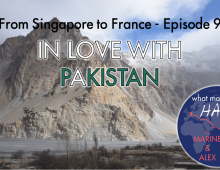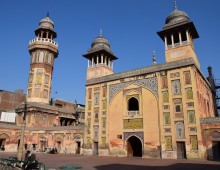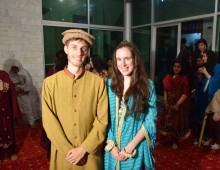
One morning, we finally decided to leave Karimabad. We started to wait for a local pick up to bring us to Aliabad, a few kilometers away, to get another bus to Gilgit. But suddenly a car stopped in front of us. “Bonjour !” (Good morning) happily said the driver in a perfect French. It was Karim, a businessman we had met the day before. He had studied for three years in Paris and had been happy to talk to us in French. These days, he builds a café in Karimabad along with a hotel. He was also heading to Aliabad so he took us in his car! At the back of his car, surrounded by our backpacks, I thought again that we will miss Karimabad and its people a lot. After a 10-minute drive, Karim dropped us at the bus station in Aliabad, helped us carry our bags on the roof of the minivan heading to Gilgit (no space inside so you have to attach your bags outside on the roof), and warmly said goodbye.
Two hours after, we arrived in Gilgit, a big city compared to Karimabad. We could feel that the people there were more conservative. All the women wore their scarf hiding their hair, and we had our first lunch in a small restaurant, in a space separated from the main room by curtains: the space for families where women and married couples eat, aside from men. We took a room at Madina Guesthouse next to the bazaar and had a walk around until the Mosque. We could feel the looks of the people on us so we found shelter in a small bakery where we tried delicious sweets while having a good milk tea. Some customers (only men) engaged the conversation with us, and two of them even paid us a cup of tea! Really, what strucks in Pakistan is that every individual is dedicated to give a great image of his country to foreigners!
At night, we had the rather bad surprise to see that electricity in Gilgit was worse than in Hunza and so we did not have electricity at the guesthouse, and moreover no hot water to shower… The promise of a good hot shower had been a motivation to leave Karimabad! We also had no internet to contact Tajammul, the Pakistani man we had met on the bus crossing the border and who had told us to contact him while in Gilgit.
The next morning, we went for the search of a Sim card to be able to contact Tajammul. However in Pakistan, we learnt that you need to have a Pakistani ID to buy a Sim card, which obviously we had not… So we went back to our guesthouse and hopefully the owner let us make a call to Tajammul. He was so happy to hear form us!! He came immediately to the guesthouse and offered us a good lunch. We had a nice talk and he invited us to leave our guesthouse and stay at his home. We happily accepted, and so he drove us around Gilgit the rest of the day and we settled in his house. Gilgit can be split in several parts: a dense part around the bazaar and a breezier part at the outskirts where Tajammul lived in a nice house with his parents, his brother, his brother’s wife and their children. Family is very important to Pakistani people, it is the heart of their society. People would never let their parents alone and would live with them to take care of them. And this place of family is also a question lot of them ask to us as Westerners. They are rather shocked that Western people put their parents in retirement houses. And they did not understand when we told them that our parents would consider it as a burden if we would still live with them when aged 30! We also discovered some cultural codes: even if we lived in Tajammul’s house, Alex never entered the core part of the house, where his sister in law and her children live. On the contrary, Tajammul would bring me several times there to spend some time with her and the children while he would discuss in another room with Alex. Meaning that male visitors are usually restricted to some parts of the house, whether women visitors can be everywhere. We could say that in Pakistan, men still dominate the working life, but women manage the private family life and run the household. It seems to change though as more and more women start to have high level professions, like doctors, lawyers, teachers…
For our second day in Gilgit, Tajammul took us for a walk on the mountain next to his home to see the city from above. It was beautiful!
At 6pm, while we were having a rest in our room in the dark (because wherever you live in Gilgit, when there is no electricity everyone is concerned!) a group of women suddenly entered the room. We were surprised! They happened to be Tajammul’s sister family and they were so friendly that they invited us for dinner in their house just next door. We had a lovely evening with them. The father, husband of Tajammul’s sister, had been in France and proudly showed us his RATP map of Paris network. What a strange feeling for us to see this map so far from Paris! And actually at first he showed it to us thinking it was the map of France! We saw the family several times during our stay in Gilgit, always happy to have interesting chats about politics… and food.
We also made some plans to get away from Gilgit the next day to go together to Naltar Valley, not too far from Gilgit. So the next morning we left for Naltar Valley. First before taking the bus, we stopped at the bazaar to buy some food, as we planned to stay one night there. Tajammul bought fruits and vegetables, and rice. He also wanted some chicken and went to the butcher. Here a quick scene happened: the man took a chicken alive from his shop, weighted it and then killed it in front of us! I took the bag of chicken pieces, I did not expect fresh chicken to be that warm!
Then it was time to take the bus, meaning the old jeep, to Naltar Valley! The drive was quite hectic, 2.5 hours of bumpy road, that we enjoyed anyway because the views were amazing. We drove on dusty and rocky roads, surrounded by rocks.
When we arrived we were surprised to find a beautiful valley with green conifers, like when you reach an oasis after hours in the desert. Tajammul had arranged that we could stay at the government resthouse, usually dedicated to government officials. It was quite cold, but we managed to cook a good dinner and we enjoyed the evening sitting outside next to a homemade fire, discussing about Pakistani and international politics.
The next morning we went for a nice walk. There were even chairlifts on the mountain so that we felt we were in the Alps! But snow was not there, it would come later in January or February. Landscapes were stunning!
We decided to spend one more night there and the next day early morning we went back to Gilgit, admiring the sunrise on the dusty road.
The jeep in front of us was full of people, standing at the back, ready to fall at each bump of the road. Regularly, goats would cross the road in front of us in a dusty cloud.
Back in Gilgit, we spent the afternoon relaxing, and in the evening we had a last dinner with Tajammul and a last cup of tea with his sister’s family. We promised to come back because we had such a great time with them and we have lot of more to discover in Gilgit’s region. Next time, we will come in spring, and we plan to go to Skardu to go closer to K2!
The next morning, Tajammul took us to the bus to Islamabad, taking care again of us, offering us food for the trip. We were very sad to leave him as we had such a great time together, but we were sure we would see each other again!
We have to say that we are amazed how people in Pakistan give without expecting anything in return, we have never met such generous people since any of our travels.




Wonderful! Again, I’m sold…
What a big city Gilgit has become now! All those new cars? Where are all the trucks? But still power shortage at any moment. I’m wondering if they’ve managed to keep the old diesel generators…
Are you kidding about the “old jeep”? This Toyota SUV was new and in perfect condition!
Haha yes they still have the old diesel generators and they are still very useful (and smelly!) And there are still a lot of colorful trucks around the bazaar, a colorful feast for the eyes!